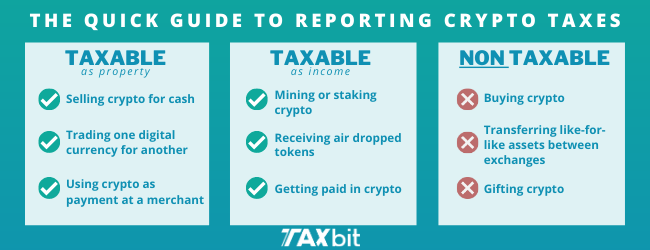Confused about what cryptocurrency activity to include on your tax return? You're not alone. In this post, we'll demystify cryptocurrency tax reporting, including what crypto activity is taxable—and what isn't—so you can properly record these when filing your taxes.
Cryptocurrency is evolving the world of finance, as evident in news headlines around the recent CoinBase IPO and large companies like Venmo and Mastercard announcing support of cryptocurrencies. But it’s not only the media that’s taking notice. The growing use of digital currencies has also caught the attention of the IRS, who will be looking closely at tax returns for proper cryptocurrency tax reporting.
For many that own or interact with digital currencies, the IRS’s guidance on cryptocurrency tax reporting has raised more questions than answers. While taxes are not necessarily anyone’s favorite topic, it’s important to understand when you need to report taxes on crypto in order to avoid a costly IRS audit.
Do I need to report cryptocurrency on my taxes?
For the majority of people who have interacted with cryptocurrency, the answer is yes, you do need to report crypto on your taxes. However, there are a few situations that don’t result in a taxable event, which we will clarify below.
With that said, it’s important to understand what type of activity exactly constitutes a taxable event when filling out your tax forms. For the first time ever, the IRS has placed a question at the top of Form 1040 that asks , “[a]t any time during 2020, did you receive, sell, send, exchange, or otherwise acquire any financial interest in any virtual currency?”
Essentially, by placing this question front and center on Form 1040, the IRS is indicating that you can no longer claim you simply didn’t know you were supposed to report it.
By checking yes to the question above, the IRS will look to see if you also filed an IRS 8949 form, the same form used when reporting gains and losses on stocks or equities. And if you fail to file this form, you can almost certainly expect to be audited.
But, as mentioned above, not all cryptocurrency activity is taxable. Let’s break down what events you do need to include in your tax reporting, and what sort of events aren’t taxable.
What crypto activity is taxable?
First, it’s important to note that when investing and transacting with cryptocurrency, it’s taxed as property much like stocks, meaning you must report any capital gains and losses when disposing of it. Below are the most common crypto activities that you do need to report on your tax form:
- Selling your crypto for cash
- Trading one cryptocurrency for another digital currency
- Using cryptocurrency at a merchant as payment (for those who use crypto debit cards, this applies to you as well)
In addition to reporting gains and losses on tax returns, there’s a few additional situations that you may need to account for. If you received cryptocurrency in the form of payment, you will need to report these events as income. Here’s a few examples:
- Receiving airdropped tokens resulting from a hard fork
- Staking or mining cryptocurrency
- Getting paid in crypto
It is possible to report cryptocurrency as both property and income depending on how you used it. For example, if you’re a gig worker that was paid in crypto and then used your digital currency to buy a coffee at a participating merchant, you would be required to report your cryptocurrency income on Form 1040 in addition to filing form IRS 8949 for your capital gain or loss when disposing of the crypto to buy coffee.
Because every trade or sale is a taxable event, it’s not unusual for cryptocurrency traders to have hundreds, if not thousands, of transactions to report. All of these activities must be reported, even if you experienced a capital loss. In fact, a capital loss can actually lessen the tax burden, and occasionally result in a larger refund.

What crypto activity is nontaxable?
Now that you understand what are considered taxable events in cryptocurrency, let’s take a look at non-taxable events. These are a few examples of instances that would not need to be included on your IRS 8949:
- Transferring like for like assets between exchanges
- Buying cryptocurrency (this isn’t taxable, but it does set your cost-basis)
- Gifting cryptocurrency (this excludes large gifts that may trigger other tax obligations).
- Donating cryptocurrency (instead, this is tax deductible!)
While it’s true that gifting and donating cryptocurrency are not taxable events, it is still in your best interest to report these on your tax return as you may be eligible for the itemized charitable deduction.
How to report cryptocurrency on your tax return:
Step 1: Gather a list of all your exchanges and transactions (including any 1099 forms exchanges sent you)
Step 2: Calculate your capital gains and losses
Step 3: Fill out IRS Form 8949 for all events taxable as property
Step 4: Transfer totals from you 8949 form to your Form 1040 Schedule D
Step 5: Fill out any remaining cryptocurrency income on Form 1040
To continue learning about Cryptocurrency Tax Basics, see the additional articles in the series:
- Cryptocurrency Taxes
- Cryptocurrency Tax Forms
- Cryptocurrency Tax Rate
- Taxes on Cryptocurrency Gains
- Cryptocurrency Tax Laws
- How to Report Cryptocurrency on Taxes
- Crypto Losses Tax
Simplify cryptocurrency tax reporting with Taxbit
If you’re overwhelmed by the time-intensive and complex burden of cryptocurrency tax reporting — we’re here to help! Taxbit was founded by CPAs and Tax Lawyers who have simplified the entire process.
Taxbit connects to all the major exchanges and wallets you can easily link and track every transaction in real-time throughout the year. Now, you not only have a trusted source to quickly calculate your taxes, you have a resource throughout the year to make tax-optimized trades via our Tax Optimizer. We ’re here to help empower you and remove the burden of cryptocurrency taxes.
.png)


